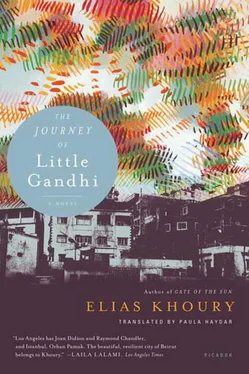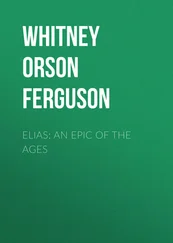“I’ve spent my whole life with only my right eye. I see everything from the right. I’m used to that, and it’s all right. I don’t know why God created two eyes, it must be His wisdom, but as for me, it’s all right this way.”
That’s what Little Gandhi said to Doctor Atef, many years after that incident, when he suggested Gandhi see an eye specialist at American University Hospital.
“Forget it, Doctor,” Gandhi said and went on shining his shoes.
Gandhi didn’t remember his childhood, for childhood in Mashta Hasan passed by as if it had never happened at all. He knew he was born around 1915, and that he went to the village Qur’an school, where he memorized the Holy Qur’an at the age of seven under the supervision of the blind teacher Sheikh Zakariyya Hamid. Then he went to the nuns’ school for a couple years and then had to quit and stay at home when his father stopped paying his tuition. He didn’t know why his father never took him to work with him. He used to leave him at home as if he were one of the girls. He remembered squatting for hours in front of his black house in Mashta Hasan. He remembered the great cliff that separated Mashta Hasan from Mashta Hammoud, and the green cornfields that stretched for miles.
Little Gandhi didn’t eat at home. Most of the time his father’s wives and daughters would send him out of the house. His father had only one son, and the house was full of wives and daughters. His father was always depressed and mean. He’d hit his wives and laugh out loud. Gandhi remembered those loud laughs that sliced through the thin curtain separating the room from the rest of the house. But he didn’t remember his father’s words.
Gandhi didn’t remember much about the village he fled from, narrow roads, dirt, pebbles, freezing cold that made his teeth chatter. It was as though he never lived in that village, or as if he’d slept through it all. He’d mention how his greatest pleasure was to sleep. Their house consisted of a big room and a small room separated by a brown curtain. Everyone slept in the big room, which doubled as a living room for welcoming guests during the day. His father was the only one who would sleep on the brass bed in the small room with one of his wives.
Gandhi remembers sleep meant women. He’d sleep in a big room filled with women, with voices and arguments and shouting all around him. The floor of the big room was covered with mattresses, and on them slept the women with their daughters all around them, and he slept all alone in the southern corner of the room. He savored his aloneness. There Gandhi discovered pleasure, in the southern corner, all alone, and where he saw with one eye. Gandhi discovered the shadows of the women as they got undressed and laughed, and the smell of perfume that wafted out from their nightgowns.
Gandhi lived alone in the village. His father wasn’t poor, but he didn’t own any land; he sold it in order to get married. He owned a store in Arida, a village about a halfhour walk from Mashta Hasan. His father would go there every day riding on his donkey and come back in the evening with food.
Gandhi ate only at night, when his father returned. They’d sit alone in front of the tray of food placed on the floor and eat, the women coming and going around them without sitting down to eat. Gandhi would’ve preferred eating after his father finished, when the tray of food transformed into a party with the women and their daughters fighting over the pieces of bread and chick-peas planted on top of the cooked wheat. When Gandhi would sit with his father around the somber tray of food he had no desire to eat, for eating with his father was a sad, silent ritual, where all he heard was lips smacking over the food. But he was not allowed to eat with the women. The Gypsy woman his father married the moment of his birth would kick him out. He’d see the whites of her eyes as she motioned for him to go, and so he’d get scared and leave. He’d go to the courtyard near the door, squat down, listen, and take the leftovers of bread and food from one of his sisters, and then he’d go off on his daily excursion through the black dirt roads.
Gandhi had no recollection of his sisters; in his mind he pictured them all as one. When he returned to the village for his father’s burial, he didn’t recognize any of them. He embraced them and their husbands, but he didn’t feel as though they were his sisters. Only the Gypsy woman was part of his memory of white eyes. He felt a special affection for her. With her worn out clothes and face covered with pimples, she reminded him of the beggars he met every day in the streets of Beirut. She asked him for money, so he gave it to her. She told him his aunt Khadija, who had nursed him as a baby, had been dead for two years, and that they sent for him to come, but he never came.
Gandhi was alone among them. He gave the Gypsy some money and decided to go back to Beirut. And in those fields that he did not recognize, he remembered only that smell. When he walked in the village at night, after the mourners left, nothing drew him to the place except that smell. Only the smell itself remained from his childhood, for childhood is a world of smells, and the world we leave behind we never go back to, because we don’t know it. Gandhi knew nothing.
In the village he married his cousin.
His uncle sold lupine beans from a pushcart in the streets of Tripoli. He saw him at the wake but didn’t recognize him. Poverty had devoured his eyes, and age had transformed him into the remnants of a man. The Husn Ahmad family, which traced back its roots to the sheikhs of the Akkar region, had lost all their property to time, fear, and marriage. Gandhi’s father sold the land in order to support his wives, and his uncle was forced to migrate from the village after he divorced his second wife, the daughter of Saeed Zahraman. Her father came and told him to pay ten times the amount he owed him according to the marriage contract. He was accompanied by a group of armed men from his tribe and said he’d destroy Mashta Hasan and everyone in it. So his poor uncle was forced to sell the last two remaining pieces of land he owned, and paid, and took his wife and children and fled from the village. He went to live in Tripoli and never went back to the village except for brief visits.
And that day, during the burial of Husn, Little Gandhi’s father, the uncle came to Gandhi. He was sitting beside him, scratching his nose and blowing it. Then he turned toward him and discussed his daughter with him. Gandhi agreed to marry her. He was twenty years old and wanted to start a new job. He came back, married the girl, and took her to Beirut.
The first day he was afraid of her as they rode in the taxi that took them to Halba, on the way to Beirut. He saw the whites of her eyes. He remembered the whites of the gypsy wife’s eyes. He said to himself she’d kill him, and he’d be better off if he divorced her. But she stayed with him and gave him seven children. They all died before she had Husn and Suad. She wore him out with hospitals and the fear of her dying.
She was a silent woman. When he’d come home she’d sit quietly and not ask anything. She’d cook and clean, but she didn’t care about anything. And Gandhi alone took on the difficult burden of their daughter.
Gandhi didn’t remember much about Mashta Hasan.
“We don’t own anything there,” he said to me. “When you don’t have any land, it doesn’t have any meaning. Mashta Hasan is nothing to me. Even the house, we found out my father had mortgaged it … I don’t know about the women, they went back to their villages, and the daughters got married, and I’m here.”
Gandhi said he went once to the village after his father’s death. “I went to see a distant cousin of mine, and there I found out the world had changed. The smell of apples filled the place. They stopped planting corn and wheat and planted apple trees. It was late August and the apples dangled from the trees, and their aroma wafted in the plain. From that day on I started loving apples, before then I didn’t like them, to me they tasted like potatoes. I couldn’t understand that American professor. I never saw him without an apple in his hand, chomping on it, while his books and notebooks nearly fell from his other hand. Now I love apples, the smell of them on the tree slices into your heart.”
Читать дальше












